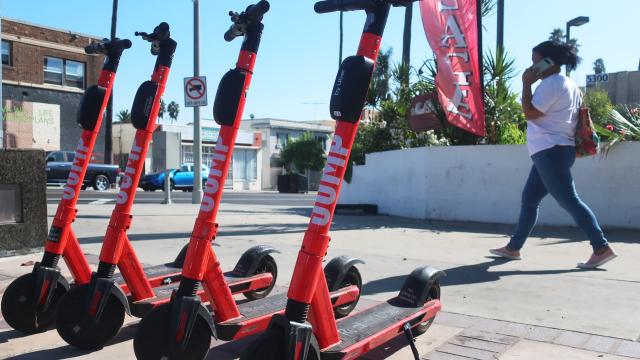This week, the EFF announced it’d be partnering with the California-based branches of the ACLU in filing a joint lawsuit against the entire city of Los Angeles for collecting “detailed trip data,” along with the “real-time locations and routes” for the tens of thousands of scooters that LA residents ride each day.
The suit was filed yesterday on behalf of Eric Alejo and Justin Sanchez, two scooter riders who, along with the Northern and Southern branches of California’s ACLU, are looking to get a court order quashing the current regulations being conducted by the Los Angeles Department of Transportation ” or LADOT for short. Under the current mandate, so-called “dockless vehicles” ” like the scooters operated by JUMP, Lyft, and Lime ” aren’t only required to collect minute-by-minute details about every trip taken within Los Angeles’s city limits, but to hand that data to city officials.
The cover story for this massive data-mining operation has been a bit flimsy. According to the court records regarding the suit, LADOT initially began collecting these sorts of details on its riders back in 2018, when the scourge of electric scooters descended on cities across the US, including LA. At the time, the city pitched what it called a “Mobility Data Specification“ ” or MDS ” as a way to mitigate the way scooters were seen cluttering and clogging other streets across the country.
But according to the suit, the city doesn’t need to gather such granular data to give pedestrians the right-of-way.
“The city has never offered a reasonable justification for why it needs such granular and precise location data, saying that the goal is to “experiment” with it in setting policies for motorised scooter use,” said an EFF spokesperson regarding the suit.
“The Los Angeles City Council asked the LADOT to provide a report about the specific regulatory purposes for data collection and how it will be used by Feb. 25,” they added. “To date, the agency has not done so.”
According to the suit, the MDS operated by hoovering location data through a GPS tracker lodged into each scooter ” and as the plaintiffs (rightfully) point out, while something as precise as GPS-driven location data might not identify a given rider directly, it ultimately doesn’t matter. Even if you don’t have someone’s name, being able to track a scooter-rider as they say, scoot from home to work and back again can give you a pretty clear picture of who that rider is.
While the exact motive behind this data collection might be fuzzy, the city has, in the past, flatly denied that anyone’s using the data gleaned from these rides for any monetary purpose. Still, it’s not hard to be a bit suspicious: location-based targeting is an insanely profitable enterprise that drives millions of dollars in consumer spending each year ” and as the suit points out, an anonymous data point like location hasn’t stopped these businesses from profiting before, and it’s unlikely to stop them now.
“The government’s appropriate impulse to regulate city streets and ensure affordable, accessible transportation for all should not mean that individual vehicle riders’ every move is tracked and stored without their knowledge,” said Mohammad Tajsar, a senior staff attorney at the Southern California branch of the ACLU.
“There are better ways to keep ride-share companies in check than to violate the constitutional rights of ordinary Angelenos who ride their vehicles.”
